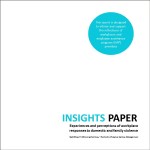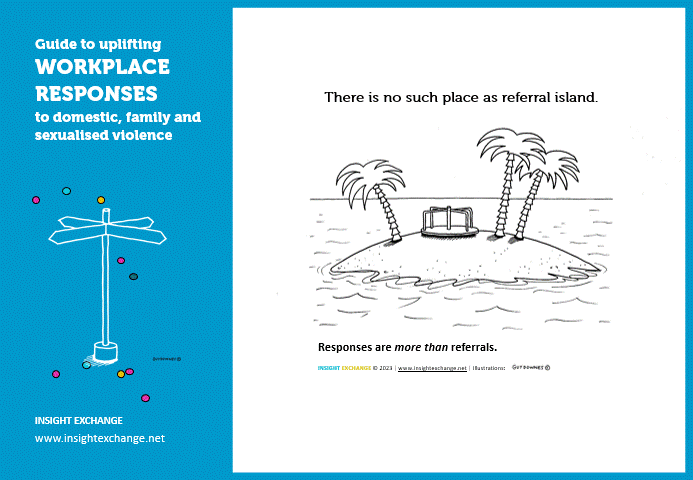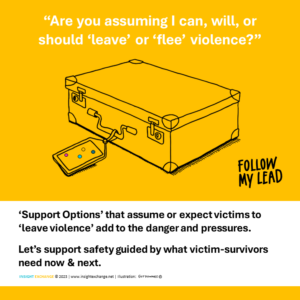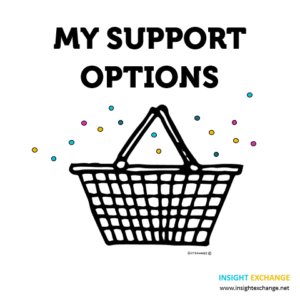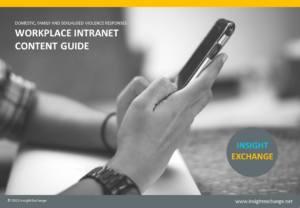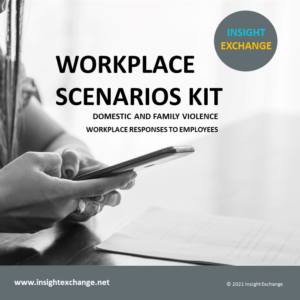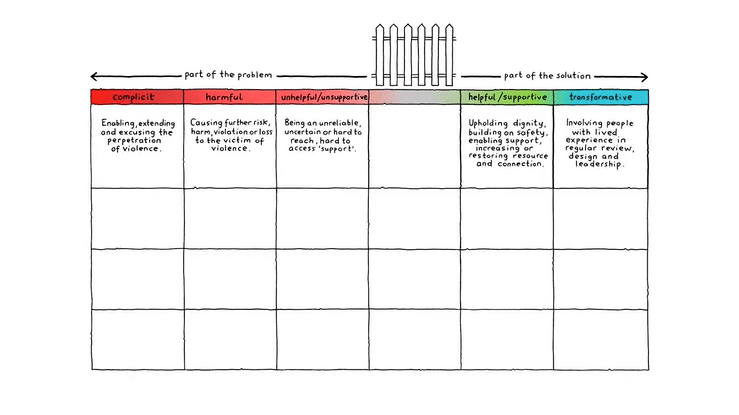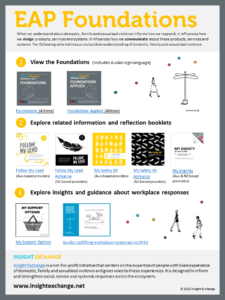Workplace Responses
[Employees, Contractors, Volunteers]
We invite organisations and institutions to understand the importance of workplace responses in the context of a strategic holistic response to domestic, family and sexualised violence.
The response of the workplace is important to victims of domestic, family and sexualised violence for many possible reasons including their sense of self, social connections and safety. Importantly, having an income supports economic safety, keepings more options on the table for victims considering their future.
Between 55 and 70 per cent of people experiencing domestic and family violence are in the paid workforce.
UN Women, 2017, ‘Taking the first step: Workplace responses to domestic and family violence'.
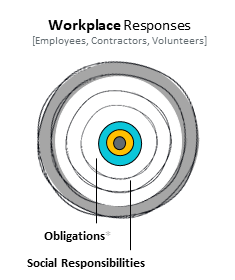
FRAMEWORK
- Reflect on the Futures Framework
- Follow the Leadership Roadmap
- Implement the Support Menu (Workplace Focus)
FOUNDATIONS
The Insight Exchange Workplace Responses video is now replaced by the Insight Exchange Foundations (45 mins video) & Foundations Applied (40mins video).
The Insight Exchange Reflections Kit collates the resources featured in the Foundations and Foundations Applied.
Insights paper
Insights Paper: Experiences and perceptions of workplace responses to domestic and family violence.
This report is designed to inform and support the reflections of workplaces and employee assistance program (EAP) providers.
Asked what they’d most like us to influence about workplace responses to DFV, respondents’ top three wishes were for
- People in the workplace to be compassionate and non judgmental
- Workplaces to provide more, or better, tangible support and
- Improved understanding and awareness of domestic and family violence
My Support Options
People experiencing domestic, family and sexualised violence rely on multiple parts of a complex information and support ecosystem for their safety and wellbeing. When a person who is experiencing domestic, family and sexualised violence reaches out it might be the first, only or last time they seek support. There is no one path or preference. And every option matters.
‘Support Options’ that assume or expect victims to ‘leave violence’ add to the danger and pressures. Let’s support safety guided by what victim-survivors need now & next.
Explore My Support Options
Intranet Guide
The Workplace Intranet Content Guide is designed to support organisations in their intranet communication about workplace responses to domestic, family and sexualised violence. The guide is not exhaustive or conclusive. It is designed to support reflection and review of what your organisation has in place already, how that might need to be adapted, and what might be missing. Listening mechanisms to hear from people with lived experience will inform how and where further refinements can be made in your workplace responses.
Note: The Workplace Intranet Content Guide is a supporting resource to the Insight Exchange Futures Framework and introduced through the Support Menu and Reflections Kit.
Workplace Scenarios Kit
The Workplace Scenarios Kit is designed to provide practical support to organisations as they assess their existing and potential responses to experiences of domestic and family violence. It complements the Futures Framework and other Insight Exchange materials designed to inform and support responders.
The Kit brings together extracts from lived experience narratives (as a possible proxy for employees) with real world scenarios to reveal what is (and is not) in place in your workplace to support the needs of individual employees who may seek support. It will guide organisations to establish their essential mechanisms for responding to domestic and family violence through listening, language and policies.
Quality Response Continuum
What do we need to be thinking about when it comes to the quality of our responses to domestic, family and sexualised violence?
The quality response continuum is an Insight Exchange tool designed to support critical reflection about the quality of our responses.
'There is no fence to sit on.'
View the Quality Response Continuum animation (3.30mins)
View the illustrative examples in the library of Quality Response Continuum examples.
Workplace and EAP Intersection
Does your workplace contract an Employee Assistance Program?
Employee Assistance Professional Association of Australasia (EAPAA) provider members (76) throughout Australasia oversee over 11,500 organisations, providing coverage to 9.4 million direct employees. (Source: Engagement Rate of the Employee Assistance Professional Association of Australasia (Inc.) October 2021).
The readiness and quality of Employee Assistance Program responses to domestic and family violence matter. Every EAP. Any workplace.
In 2022, the Workplace Gender Equality Agency (WGEA) reported a range of measures that were highly prevalent among organisations offering support to employees experiencing domestic and family violence. 92.8% of organisations offered access to their company’s Employee Assistance Program (EAP).
But how much, how well and in what ways does the procuring workplace assume or ask about the quality of responses to domestic, family and sexualised violence?
EAP Foundations
The free (donated) EAP Foundations includes selected resources build on understanding of domestic, family and sexualised violence.
EAP individuals, teams and providers can continue to directly draw from the work of Insight Exchange in alignment with the guidance on using Insight Exchange.
Archive of support to uplift Workplace and EAP responses
2023
In 2023 EAP individuals, teams and providers were invited to view the Foundations module. Below are some of the responses from participants.
“I want to share this workshop with others. It is truly amazing!” (EAP Practitioner)
“Thank you so much for an excellent and informative session. There are many resources and workshops out there about DV, but I really got a lot out of this one because it provoked thought and reflection. I love the focus on meaning and language etc., and the 6 Foundations. Thank you and I will definitely promote it amongst my colleagues.” (Psychologist/EAP Provider)
Find out more about the foundations resources and reviews here: Foundations and Foundations Applied – Insight Exchange
2021 - 2022
A shared understanding is vital for coherent and reliable responses. The intersection of workplaces and EAPs is important as workplaces rely on EAPS to be informed and ready to respond as part of the response menu offered to employees. In 2022 Insight Exchange supported a subset of EAPs in Australia and New Zealand in the following ways:
- Facilitating EAP Masterclasses
- No Hidden Door - EAP Industry data & Guidance: Website content and functions
- No Hidden Door - EAP customised reports per EAP
- Boxset of Insight Exchange resources per EAP Provider
- Facilitating a set of 3 EAP reflective practice sessions
- Speaking at the Employee Assistance Professional Association of Australasia (EAPAA) Virtual Wellness Day Aug 2022 & Annual Conference Nov 2022
2020
Workplace Kit: Understanding and responding to employees experiencing domestic and family violence. A Workplace Kit (including the Insights Paper, Follow My Lead and My Safety Kit) was launched on 19th February 2020 with 46 individuals attending from 27 different organisations. Read the feedback comments from attendees at the launch. The 3 resources in the workplace kit are are accessible as distinct resources and Follow My Lead and My Safety Kit are published as new editions.
2019 - 2020
The network of workplaces and employee assistance programs (EAPs) was an informal, national network facilitated by Insight Exchange, through 2019/20. Participating organisations shared a commitment to improving awareness of and responses to domestic and family violence in Australia.
Participants in the network were interested in exploring the following challenges in responding to domestic and family violence (DFV):
- Understanding scope and duty of care of organisations; what role does the workplace and EAP play in responding to an individual experiencing DFV? What role could/should each of these play?
- Improving how organisations and EAPs support, not just what is offered in support of, people experiencing DFV.
- First-responder support - identifying and providing support for workplace managers and EAP practitioners responding to people experiencing DFV.
- Responding to people who use violence – how do organisations and EAPs respond to and support people using violence?
- Managing complexity including: privacy and confidentiality; understanding where organisations, and individuals within them, fit in the broader ecosystem; and negotiating EAP contracts.
Participants included: Access EAP, AGL Energy, Assure Programs, Commonwealth Bank, Converge International, CSIRO, Employee Assistance Professionals Association Australasia, QBE, PwC, Sydney Water, Tabcorp.
The Workplace Insights Paper hosts some reflection questions for workplaces and for EAPs.

